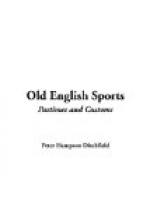“Item—paid
to Morris-dancers and the Minstrels, meat and
drink at Whitsuntide—iii^s.
iiii^d.”
When the feasting had ended, archery, running races in sacks, grinning through a horse-collar (each competitor trying to make the most ludicrous grimaces), afforded amusement to the light-hearted spectators.
The game of quarter-staff is an old pastime which was a great favourite among the rustics of Berkshire. The quarter-staff is a tough piece of wood about eight feet long, which the player grasped in the middle with one hand, while with the other he kept a loose hold midway between the middle and one end. The object of the game was, to use the forcible language of the time, to “break the head” of the opponent. On the White Horse Hill, where Alfred fought against the Danes, and carved out on the hill-side the White Horse as a memorial of his victory, many a rural sport has been played, and at the periodical “scourings of the Horse” many a Berkshire head broken to see who was the noted champion of the game. An old parishioner of mine, James of Sandhurst, was once the hero of quarter-staff in the early part of the century. The whistling match was not so dangerous a contest; the prize was conferred upon the whistler who could whistle clearest, and go through his tune while a clown, or merry-andrew, made laughable grimaces before him.
[Illustration: QUARTER-STAFF.]
Another diversion common at these country gatherings was the jingling match. A large circle was inclosed with ropes, in which the players took their place. All were blindfolded with the exception of one, who was the jingler, and who carried a bell in each hand, which he was obliged to keep ringing. His object was to elude the pursuit of his blinded companions, and he won the prize if he was still free when the play ceased. It was an amusing sight to see the men trying to catch the active jingler, running into each other’s arms, and catching every one but the right one. When the jingling match was over, a pig with a short, well-soaped tail was turned out for the people to run after, and he who could hold it by the tail without touching any other part obtained it for his pains. There was also a game called Pigeon-holes, which appears to have been somewhat similar to our present game of bagatelle.
And so with laughter and with song the feast ended, the evening shadows fell around, and the happy rustics retired to their humble thatched-roofed homes. The proceeds of these church-ales were often considerable. “There were no rates for the poor in my grandfather’s time,” says one writer, “the church-ale of Whitsuntide did the business”; and whether the parishioners had to pay a tax for the support of the King’s army, or to repair the church, or to maintain some orphan children, it was generally found “that something still remained to cover the bottom of the purse.”




